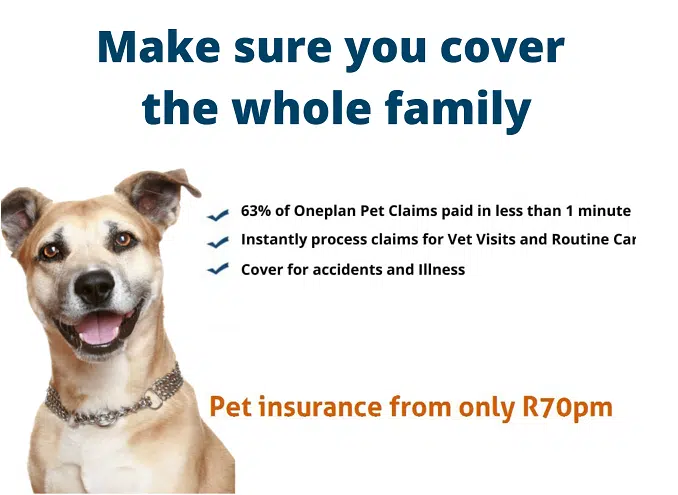
What to look out for when choosing pet insurance
Let’s face it, pet insurance isn’t exactly at the top of the priority list for some pet parents.
Not thinking much of it, we left her for a day or so but soon realised it was more than just a sprained leg.
Off to the vet we took her and one X-ray and R1 800 later. We were told she had broken her leg and needed a stent to be put in. It was an unforeseen expense that we didn’t budget for.
We had to make a decision, either scrape the money together for surgery or leave her and hope for the best. The latter was never an option.
In hindsight, had we had pet insurance, it would have saved us lots of money and the hassle of having to foot the bill.
But it’s not everyone who can afford comprehensive pet insurance. So how do you know which one to choose?

“It’s important to be realistic about whether you can afford to look after your pet’s medical needs, ensuring that they have access to quality care when they need it most,”
Even new puppies or kittens could incur substantial medical costs in the first year alone through initial vaccinations, de-worming, neutering, tick and flea treatment, micro-chipping and vet consultations which typically cost around R600 to R700 per consultation.

Not to mention the soaring costs related to other health problems and emergencies, where something like cruciate ligament surgery could potentially cost as much as R30 000
It’s a good idea to check out pet insurance, which is underwritten by insurance companies. Your pet’s age, species, and breed, as well as where you live, will be taken into consideration
Anthony also adds that pet parents commonly make the mistake of assuming that pet insurance works the same way as human medical insurance.
In fact, veterinary hospitals do not submit claims on your pet’s behalf, nor are veterinary hospitals involved in the financial aspects of a claim.

Depending on your policy, you may have to pay an excess amount. If your pet is hospitalised, inform your insurance provider and check what they will cover so that you are prepared for any costs you may personally incur.
To make sure you choose the right fit, the following key questions that you should ask when you buy pet insurance:
- Is one of the conditions that my pet must have a microchip?
- Are there any age exclusions?
- What is the waiting period on the policy?
- Am I restricted to using a particular vet or can I use any vet of my choice?
- What is the excess payable when I make a claim?
- Do you cover common breed conditions?
- Do you apply sub-limits within your annual maximum cover? Sub-limits could be applied to things such as consultation fees, hospitalisation, procedures (x-rays, surgery), and blood tests.
- Do you have a maximum limit per claim?
- Do you offer chronic support care for ongoing conditions?
- Must dental care claims come off your routine care benefit?
Getting into these details and carefully comparing various offerings will make sure that you avoid any nasty surprises, that you get the best value for money and that your beloved furry friends have all the care and support that they need





